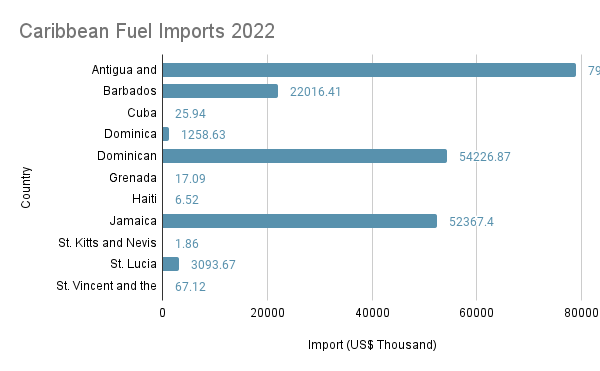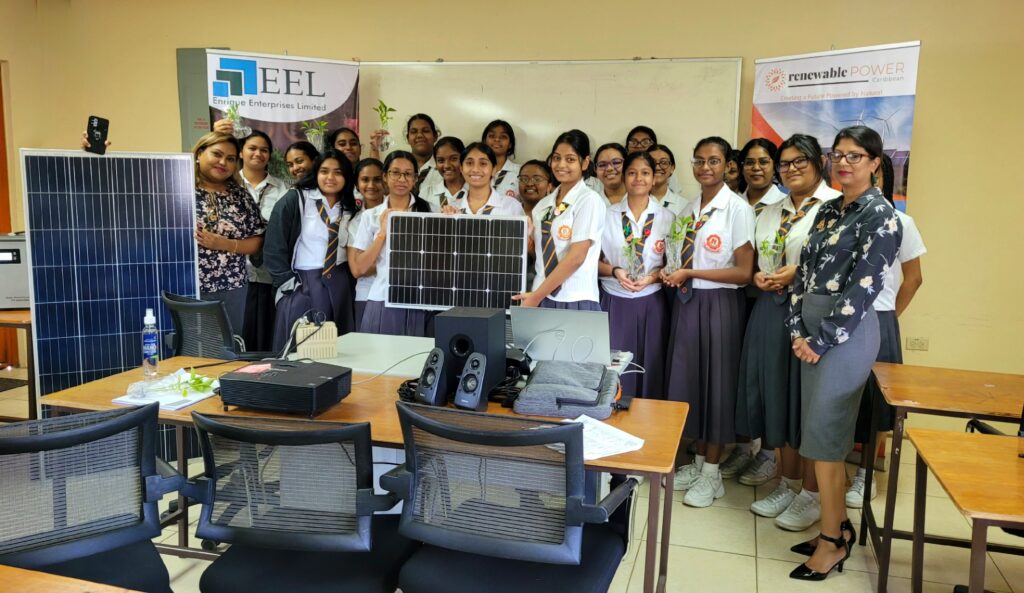Fossil fuels present multiple health risk factors to workers involved in the industry. From heat stress and dehydration to respiratory issues and cancer risks, identifying how workers are impacted is critical and it is gaining more attention. Susana Benjamin-Reece, an Occupational Safety and Health student in Guyana shared that from the industrial revolution of oil and gas, the fossil fuel industry poses many risks to workers’ safety. With a focus on the detrimental contributions of the fossil fuel industry to the climate crisis, habitats, and life, shifting towards a just energy transition is becoming increasingly possible. With workers in mind, this is a step to a much safer work environment. One where increased proactive measures to identify occupational and climate risks in the energy sector are prioritized.
The Caribbean has a significant dependence on the oil and gas industry. This proves to be much more dire for a region with great susceptibility to climate events and disasters. Excluding Trinidad and Tobago and Guyana due to their reserves, most of the region relies largely on diesel fuel and natural gas imports for its energy needs.

With a monthly production of crude oil at a range of 1,600 to 1,800 barrels in countries such as Trinidad and Tobago, these actions contribute to the climate risks faced throughout the region. Whilst countries rely on and capitalize off the diversification of the oil and gas industry, the harmful effects and risks to human life remain of great concern.
There are high rates of oil production in countries such as Trinidad and Tobago, with a booming industry that has profited from the increasing demand on a larger scale. Trinidad and Tobago is known for its oil and gas exploration and serves as the largest oil and natural gas producer in the Caribbean. Its hydrocarbon sector has shifted from predominantly oil to mostly natural gas, to which the electricity sector is also fueled. With this being a dominant industry for energy generation, the associated hazards are further heightened.
Enrique Ramkaran, Business Development Manager for Renewable Power Caribbean Limited in Trinidad and Tobago knows this all too well. Ramkaran holds an MSc. in Occupational and Environmental Safety and Health and several certifications related to HSE and renewable energy, supported by 18 years of experience in Health, Safety, and Environment and management in various sectors including oil and gas and renewable energy. Drawing from his expertise, he has identified several key risks that the fossil fuel industry poses to workers. He stated, “The fossil fuel industry, particularly oil and gas, presents numerous safety risks due to the inherent hazards associated with the extraction, processing, and transportation of these resources. Some of the primary safety risks include exposure to hazardous substances, mechanical hazards, environmental hazards, and human factors.”
Ramkaran further explained how each hazard presents different risks. For hazardous substances, he shared that workers can be at risk for a wide range of toxic chemicals, including hydrocarbons, solvents, and hydrogen sulfide, which can cause acute and chronic health effects. He mentioned the high risk of fires and explosions due to the flammable nature of fossil fuels which can result in severe injuries and fatalities.
For mechanical hazards, Ramkaran stated that the use of heavy machinery can lead to accidents and injuries if not operated and maintained properly. He added that there are additional risks of suffocation, asphyxiation, and exposure to toxic gases for workers who operate in confined spaces such as tanks and pipelines. Ramkaran added that with environmental hazards, offshore and land workers face unique risks such as extreme weather conditions, falls from heights, and the potential for oil spills. Due to the demanding nature of the job with long hours, extensive shifts, and rates of fatigue, these can increase the likelihood of work accidents.
Despite existing safety legislation to reduce risk exposure, Ramkaran stated that workers in this industry are still faced with high inherent risks. The implementation of safety management systems, comprehensive training, and enforcement of strict safety regulations can help alleviate some of the severity and likelihood of these risks, yet is that enough? To further mitigate against existing climate, environmental, and safety risks, a shift toward renewable energy may be the answer.
Decentering the existing energy industry from fossil fuel to renewables continues to be a work in progress. Countries such as Trinidad and Tobago, Guyana, Barbados, and Jamaica are increasing efforts to decenter the fossil fuel industry and mitigate its hazardous effects. Of the many great benefits that this generates, one includes the reduction of safety risks to workers from shifting from the fossil fuel industry to renewables.
Working in the renewable energy sector can reduce many of the associated risks workers face from working with oil and gas. On the differences between both sectors, Ramkaran shared, “Many renewable energy sources, such as solar and wind power, involve less direct exposure to hazardous substances, making them safer for workers. With fossil fuels, for mining and extraction, this often involves exposure to toxic substances like coal dust, methane gas, and heavy metals, which can lead to respiratory diseases, cancers, and other health problems.”

As oil and gas operations account for approximately 15 percent of energy-related emissions globally, switching to safer, natural sources of energy can put a halt to much of the irreversible damage to all forms of life, including workers in these fields. Some l benefits shared by Ramakaran include centering a more controlled environment with solar and wind power compared to the harsh conditions of fossil fuel industries, where workers may work underground or in extreme temperatures. Additionally, he shared that rapid technological advancements in the renewable energy sector lead to safer equipment, improved monitoring systems, and more efficient work processes. In contrast to the rates of technology advancements in the fossil fuel industry, the safety and climate risks associated remain significant.
Despite the many benefits, there are some careful considerations with safety risks in the renewable energy sector. With biomass energy, it releases carbon monoxide and other pollutants with the potential to create smog if it’s not captured and recycled. For hydropower, there is the likelihood of flooding in valleys and disruption of local ecosystems and livelihoods from damming water to build reservoirs. Ramkaran shared some additional safety considerations, including fall-from-height risks whilst working on wind turbines and solar panels on heights. He added that there are also risks of electrocution when working with electrical systems, such as inverters, wiring, and other electrical components, and exposure to extreme heat which can pose risks of heatstroke, dehydration, and other health symptoms and conditions.
Despite the associated risks, the renewable energy sector offers safer and more sustainable strategies for reducing climate, environmental, and safety risks compared to the fossil fuel industry. For workers, transitioning to renewable energy not only mitigates existing hazards but also prioritizes robust safety measures, creating a work environment that minimizes exposure to climate and environmental risks.
As we strive for a future where fossil fuels are no longer central to our energy landscape, organizations across the region are ramping up their efforts to increase renewable energy utilization. Steffy Heera, Chief Customer Officer for Renewable Power Caribbean Limited in Trinidad and Tobago, is leading this charge with her School Educational Tour (SET) Initiative. This program introduces secondary school students to the world of renewable energy, particularly solar power. Through this initiative, she empowers the next generation to champion sustainable development and fosters a deeper understanding of renewable energy within their communities.

Additionally, Renewable Power Caribbean provides a range of installation, commissioning, training, and maintenance services for agrivoltaics, solar photovoltaics, wind, solar lighting, solar electric vehicle charging, and energy storage systems.
In working to create greater opportunities for renewable energy locally, Heera believes that there should be an acceleration in the transition to renewable energy resources. She said, “While the country’s oil and gas industry has been a significant contributor to the economy, it’s imperative to diversify its energy portfolio to mitigate risks associated with fluctuating global energy prices and the increasing urgency of addressing climate change. However, this transition must be carried out in a just and equitable manner.

This means providing support to communities affected, investing in renewable energy infrastructure and technology, and ensuring that the benefits of renewable energy transition are equitably distributed throughout society.”
To take further action there must be an energy transition. For workers, a just energy transition is crucial but must be supplemented with additional safety measures. Susana Benjamin-Reece in Guyana explained that there is still a need for greater improvement in worker safety in the energy sector. She added that despite an existing Occupational Safety and Health Act, in place, regulations aren’t enough. To further tackle safety risks, collaborative efforts between employers, employees, governmental bodies, and stakeholders must be made. Whether in Trinidad and Tobago, Guyana, or throughout the Caribbean region, renewable energy remains a promising solution to challenge the existing climate crisis and reduce safety risks. In leading to a future where a just energy transition is at the forefront, collective action must be taken now to address how vulnerable groups such as workers are impacted and the necessary steps to create a safer environment.